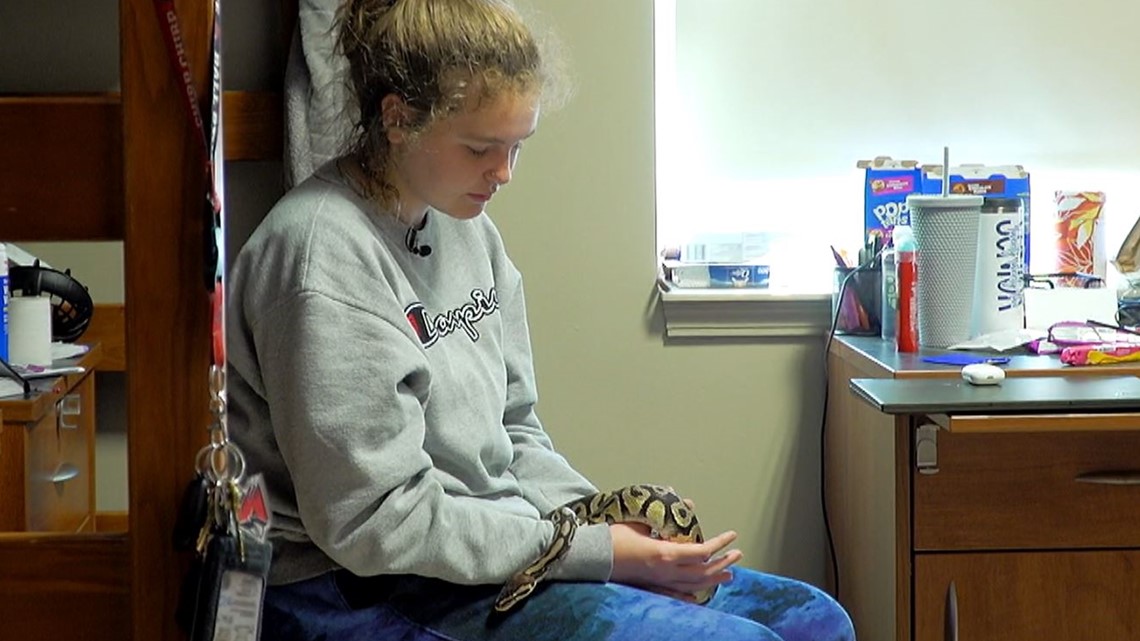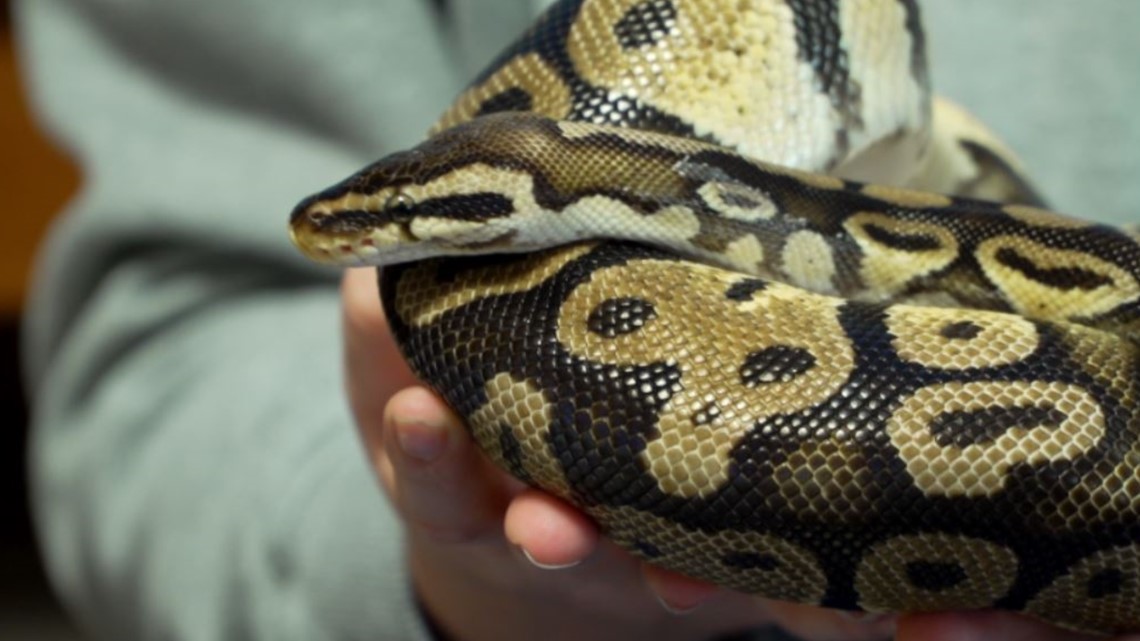More animals in college dorms as students seek mental health accommodations
The number of requests and approvals for emotional support animals on some college campuses has doubled, tripled and even more than quadrupled in recent years.

Hundreds of animals are currently living on Indiana college campuses. 13 Investigates learned some colleges are seeing increased requests and approvals for emotional support animals (ESAs) and the number of these animals has doubled, tripled and even more than quadrupled in recent years.
Eloise Richardson, a sophomore at Earlham College brought her dog Jake to live with her on campus her second year of college. He's one of 35 emotional support animals on campus.
The year before, Richardson fostered cats as part of a program no longer available on campus. She told 13News she requested to have the dog and those foster cats to help deal with a mental health disability.
"When you pet a dog or a cat, it releases oxytocin and also decreases the stress hormone cortisol," Richardson said.


The number of ESAs on each college or university campus differs greatly based on the student population and size. 13 Investigates reached out to 20 Indiana colleges and universities across the state. Seventeen schools responded to our inquiry and 12 provided a year or more of data. Seven out of a dozen showed the number of approved emotional support animals increased on campus. The numbers decreased at some schools but even some of those schools reported noticing an increase in interest and requests.
Ball State's numbers more than tripled over five school years. There are now 147 on campus. Indiana University reports the number of approved ESAs grew nearly fivefold. IU now has 94 of these specific types of assistance animals on campus this year. Compare that to just 19 during the 2019-2020 school year.
What is an emotional support animal?
While Jake is a cute, happy dog, he's also more than a pet. He's a working dog protected by federal law.
"I have anxiety and it definitely calms me down a lot more to be around animals," Richardson said.
Eloise doesn't remember what prompted her diagnosis, but her anxiety is a disability. As an emotional support animal Jake is protected as a mental health accommodation by the Fair Housing Act.
The law protects all assistance animals, which are defined as an animal that "works, provides assistance, or performs tasks for the benefit of a person with a disability, or that provides emotional support that alleviates one or more identified effects of a person's disability. An assistance animal is not a pet."
Because of those protections, many Indiana universities and colleges now have policies to accommodate ESAs.
These assistance animals are federally protected, but they are not required to be trained or allowed in public places. For the most part, they must stay in their owner's dorm room or outside. Most colleges allow them to go outside for exercise or to relieve themselves if needed but do not allow them in public spaces like a classroom or the library.
ESAs are different from the more well-known service animals, which are also federally protected. Service animals however are protected by the Americans with Disabilities Act. An updated version only refers to dogs as service animals. Although, there are still accommodations for miniature horses trained to help people with disabilities.
Service dogs must be individually trained to do work or perform tasks for a person with a disability. They're also allowed to accompany their owner in all public spaces.
While ESAs are predominantly known to help people with mental health disabilities, they are sometimes used by people with physical disabilities as well.
Approval process
Because these animals are for people with a diagnosed disability, each university or college has its own vetting process. Butler University didn't want to share its data but reports using a committee review process to determine if an emotional support animal is a proper accommodation.
Ball State University, Earlham College and other schools require several documents. Many times, the student's mental health provider must fill out a questionnaire affirming the students has been diagnosed with a disability. Doctors or therapists also must explain how an animal is part of a treatment plan that will help alleviate some of the negative effects of the student's disability.
Veterinary records are usually also required. Roommate preferences and the residential community are also taken into consideration. If a roommate says no, one of the student's living arrangements is adjusted so the accommodation is still possible.
At Ball State, there's an unusual emotional animal named Twilight. The ball python isn't as cuddly as the normal dog or cat, which may seem odd to others but not to MacKenzie Shadrick.
"I grew up around snakes," Shadrick said. "So, I've always like been used to them. Comfort, it's like a childhood thing I suppose."


The ball python is part of a treatment plan to help her cope with depression, anxiety, and PTSD.
Shadrick told 13News her mental health struggles started when she was just 9 years old. In just four months' time, her house burned down, four relatives died — including one by suicide — and her family dog was hit by a car.
"For a 9-year-old, that is a lot to go through," she said.
Years later, she still struggles. 13News spoke to her after a tough few day in November.
"This past week I had a really bad episode ... Twilight helped me a lot through that," Shadrick said. "So, this week we're going back to classes."


Down the hall, Jessliyn Shearer said the approval process took about a week, but it felt longer before she could bring her kitten Lily into the dorms.
"I found her and said 'yes, she's the one,'" Shearer said.
Shearer's roommate suggested she get an ESA after she lost several family members.
"I don't even know how to explain it, but she really does a lot," Shearer said.
Avoiding fakes
The students report the process was relatively easy for them to complete once they compiled the needed paperwork. 13News asked if they thought other students could fake having a disability to get a pet on campus.
"I mean I definitely think it is kind of an easy enough process that you could," Shearer said. "But I think that regardless or not if you actually do have mental disabilities, or whatever, I still think an animal can help you."
Ryan McCombs, the director of Purdue Fort Wayne's Disability Access Center, agreed to an extent.
"At times, it could be fairly easy," he said.
That's why he said schools need to have a thorough vetting process in place. McCombs said now colleges and universities have to be on the lookout for documents from websites that will sell ESA letters for a fee.
"We don't accept letters," McCombs said.
Instead, his school requires health care professionals fill out a questionnaire. He said that's one safeguard.
His staff also tries to warn students away from websites that offer emotional support animal certifications or registrations. His school doesn't accept those either.
"I would call them scam websites," McCombs said." There is no such thing as a registration or certification for an ESA. So oftentimes students will pay, you know, up to $260 I've seen, for an emotional support animal registration, and then provide that as documentation. And that's not documentation we would actually accept. We do know what those look like."
McCombs said his school has already rejected a handful of applications.
"And the reason for that is because they just didn't make sense," McCombs said. "Nor did the student actually have an actual diagnosis either. Things like homesickness isn't a disability."
Other schools, including Earlham, report zero rejections.
"For us, we don't have any denials," said Jenelle Job, interim director of the Office of Disability and Accessibility Services at Earlham College.
But that doesn’t mean everyone who starts the application process is approved.
"I think what ends up happening is that because we kind of have an order in which we receive paperwork and request paperwork that when we get that certification form, and the student reads that this is not a recommendation of the health care provider, then we don't receive that additional paperwork from the veterinarian," she said.
In four years of data, Indiana University only reports denying one student's request for an ESA. Last school year, there were 77 students that started the accommodation approval process but never finished.
Some never submitted all the needed documentation. Others changed their mind about needing an emotional support animal. Right now, the university is waiting on additional information from 72 out of 166 students that started the process for an emotional support animal.
Dog, cat, snake and more
While service animals are only dogs, emotional support animals can be almost any animal. Earlham College draws the line at rodents.
"One of the main reasons are that there's really great information that's put out by the CDC in terms of the diseases that rodents carry and how easily that can be spread to humans," Job said.
Purdue Fort Wayne reports allowing an animal as long as city ordinances allow them in residences.
"We don't ban any animals that haven’t been banned by the city," McCombs said.
Some animals he said would likely not be allowed on campus would be farm animals, monkeys, certain birds and "extreme exotic animals." However, rodents and tarantulas are fair game.
Vincennes University reports denying a student's request to bring a river otter on campus. That student was able to bring a cat instead. The school said laws protecting ESAs prohibit it from restricting the type and size in most cases. However, the university does have a clause barring "wild, illegal, or inherently dangerous animals."
Dogs and cats are the most popular animals of choice. 13 Investigates also learned there are hamsters, ferrets, rabbits, and guinea pigs on some campuses. Indiana State University even reports a student has a chinchilla while Trine University tells us there was a bearded dragon on campus during the 2021-2022 school year.
While the number of these animals has increased, they aren't always visible on campus because they are mostly restricted to their owner's dorm room.
Shadrick, the Ball State student with the snake, said she's happy to follow the rules to make sure Twilight is there to help when the world seems too bleak to fathom.
"I get her out and she just like kind of chills around my neck,' she said. "It's kind of like a little hug."
The freshman knows others aren't comfortable with a snake is in their midst.
"My RA came in one day and he actually talked to me about that once," she said.
When that happened, Shadrick showed the four clamps in place to make sure Twilight doesn't get out of her 75-gallon tank.
That includes her roommate, who does not like snakes but still agreed to live with Twilight. The two befriended before college and Shadrick tries to communicate when she wants to take Twilight out or when it's time for the serpent's weekly feeding.
"So, I try to help people with their comfortability as well as mine," she said.
The goal of most of the college and university rules and policies 13News reviewed is to find a good balance between respecting the majority of students, while also accommodating the small percentage with ESAs.


